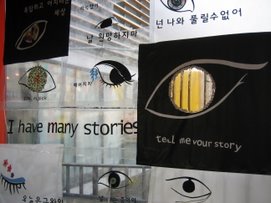You know how people joke about growing up only to become your parents and the crisis that occurs when you hear yourself echo the words you swore you'd never say to your own child? Ok, well the same thing happens with teachers.
Last year, in my copious amounts of reading (oh, the good ol' days...), I came across the term "apprenticeship of observation" (Lortie, 1975). The idea is simple -- some things you are taught explicitly, other things you learn through observation. For most people, parenting is one of those things that you learn primarily by observing. And who are your most significant models? Your own parents. Thus, it's hardly surprising that when push comes to shove, the behaviour you fall back upon and the reaction you instinctively come to in a stressful situation is that which is most familiar to you, that which you've observed time and time again for all of your life -- whether you agree with it in principle or not. Of course, this is not to say that people don't change their behaviour based on their own experiences -- they do. Across generations, in fact, corrections are common and can be severe. What I'm talking about are those moments -- those moments of crisis -- when you recognize your actions and where they are coming from, but perhaps don't want to claim them as your own.
Over the past few months, I've been thinking about this a lot. I'm not a formally trained teacher and I don't claim to be. I can say, however, that I have spent a lot of my time in the past few years thinking about education and learning. I have some core beliefs about teaching and learning, and this year has been about seeing how the theory plays out in practise. In job applications/interviews, you're frequently asked, "What is your teaching philosophy?" It's part of the game of interviewing, yes, and to a certain degree, it's bound to include your top hits of the latest educational jargon, but I also think it's an important thing to reflect on. Sometimes, though, as I'm teaching, there are key moments when I experience a huge disconnect between the teacher I want to be and the teacher I'm being. The reasons and circumstances are too complex to go into right now, but I can certainly say that I'll come out of this year having learned about both the possibilities and the limits.
As for shutting down inquiring minds, I now understand first-hand how it happens. Maybe I learned it through observation during my apprenticeship of many years of schooling, but as I was tutoring a student the other day, all I could think was that I wanted him to shut up and stop asking questions so we could get through the material. My verbal response was a slightly milder version, but I'm certain my tone was harsher than would be desired. I came out and immediately texted my friend: "I've become one of those teachers." I care about my students, I do. Just like the other teachers I know here care about their students. Yet, there's still that model, that learned behaviour in the back of our minds that comes to the surface in moments of stress that results in students reciting verb conjugations, writing lines and copying worksheets. I've managed to avoid those types of tactics so far, but the most frightening part is not the tactics we might employ; it's the attitudes that endorse them.
I've mentioned a couple times now that I've noticed these types of behaviours come out most often in times of stress. My job, as it currently stands, is honestly not that stressful, but even I feel it getting to me sometimes. What does this mean then for the local teachers here who are under such intense pressure? Education reform and the pressure on teachers have been hot topics in the news here after two teachers committed suicide in January, and the education bureau's inappropriate response only fueled controversy. Given the climate in our schools though, I've got to ask whether certain methods of instruction and/or classroom management/discipline are what I should be really worried about or whether I should turn my attention to the environment and system that fosters them...
Friday, February 17, 2006
Subscribe to:
Post Comments (Atom)


No comments:
Post a Comment